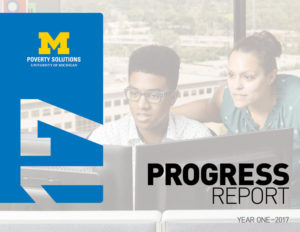In 2017, Poverty Solutions focused on collaborative, action-based research partnerships with communities and policymakers, and, in partnership with the Detroit Urban Research Center, kickstarted a number of projects that address poverty in concrete, tangible ways based on insights from academic disciplines from health care to urban planning.
“We’re proud of the accomplishments made thus far, but the work must continue to drive change not just in our community, but across the nation so that fewer people are living in poverty,” said H. Luke Shaefer, director of Poverty Solutions and U-M associate professor of social work and public policy.

A report on the first year of the initiative is available online.
Many of the past year’s efforts took place at the neighborhood level through partnerships with community organizations. In the Cody Rouge neighborhood on Detroit’s west side, U-M’s Institute for Healthcare Policy and Innovation, the Detroit Health Department and the Joy-Southfield Community Development Corporation Inc. are developing an innovative model for a community health worker-led demonstration project. It involves three Medicaid health plans working in conjunction with neighborhood residents receiving professional development training.
“What we’re looking to do is improve the health status of the Cody Rouge area, and by working together we’re able to document the efficacy of community health workers in this community,” said Rebeca Guzman, Detroit Health Department community health worker trainer.
Poverty Solutions was launched in October 2016, a university-wide effort to explore and test models to ease the effects of poverty and broadly share that knowledge, while working with community groups and supporting active-learning options for students.
New Investments
This effort includes funding more grant awards in 2018. Ten campus units received $240,185 for 11 projects for action-based research that kick off this month and are designed to prevent and alleviate poverty. Four of these new projects involve significant community-academic partnerships, with collaborative research activities facilitated in part by the Detroit Urban Research Center, a partnership among the U-M schools of Public Health, Nursing and Social Work; Detroit Health Department; Henry Ford Health System; and nine community-based organizations.
Some of the projects include:
- Examining short and long-term outcomes—such as schooling, juvenile delinquency, foster care—for older children whose mothers face unintended pregnancies.
- Exploring ways to make state energy-efficiency investments more equitable and affordable for low-income families.
- Identifying strategies for improving immigrant families’ accepting health and social services.
- Expanding upon an evidence-based intervention for improving health services for women experiencing homelessness.
In addition to these programs, Poverty Solutions will continue a partnership with Washtenaw County’s Summer18 youth employment program to pair youth with faculty and staff to help them gain work experience, mentorship and life skills training. About 40 students secured employment in the program, and Shaefer said the plan is to more than double that number of students for this year’s effort.
Poverty Solutions will continue to meet with policymakers and community leaders as part of the discussion. Many of these efforts and partnerships have occurred in Detroit, which still faces challenges despite its improving economic recovery. While the city’s poverty rate of nearly 40 percent is almost three times higher than the national average, it dropped last year—-indicating a move in the right direction.
“These new projects build on the momentum Poverty Solutions has gained in its first year,” Shaefer said. “We aim to push the boundaries of this action-based research and continue to apply our findings in real-world, scalable ways.”
Print copies of the progress report are available upon request. Contact: povertysolutions@umich.edu


